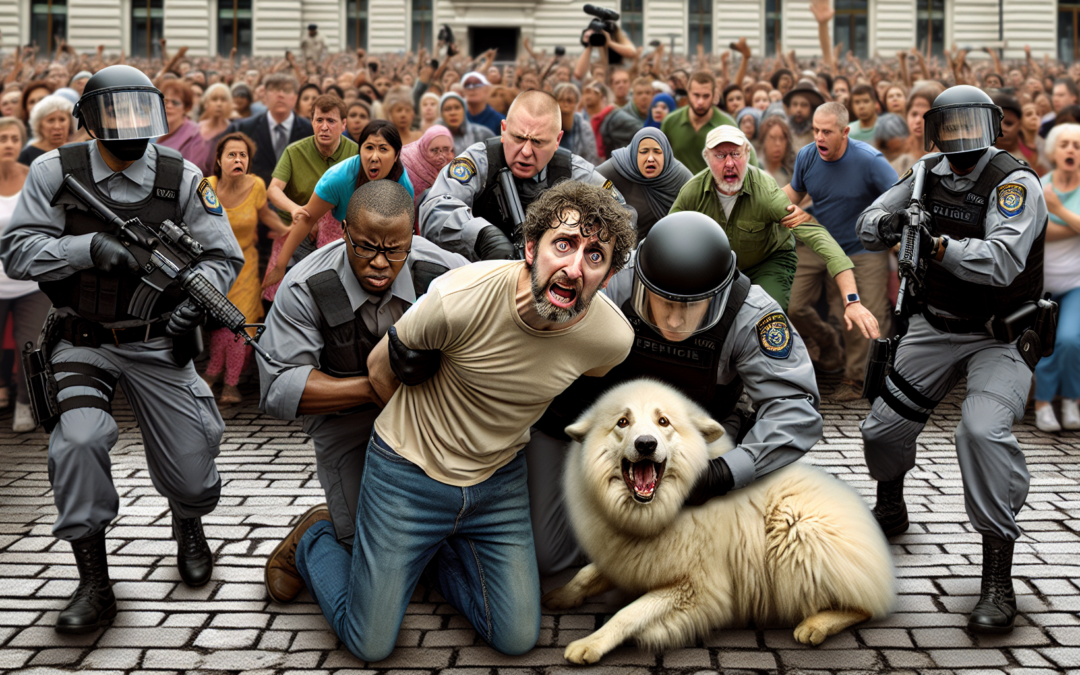The Burden of the Badge: Law Enforcement in the Texas Sheepdog Arrest
To grasp the multifaceted role that law enforcement officers play in our society, one must start with understanding the high-stakes decisions they face daily. The arrest of Texas Sheepdog, a polarizing incident that captured the nation’s attention, compels us to consider the nuanced challenges and moral conundrums confronted by the men and women who don the badge. It’s a reality not often appreciated or even noticed amidst the din of public outrage and media sensationalism, yet critical to maintaining a balanced view.
When policing the public sphere, officers are expected to anticipate, diagnose, and act swiftly in nebulous situations. The arrest incident in question unfolded in a setting combustible with tension — a crucible of conflicting beliefs over personal freedom and law enforcement supremacy. From their perspective, officers must interpret behavior that could be innocuous or inimical. It is this razor-edged discernment that tests their training, instincts, and commitment to uphold the law impartially.
Every decision made is an indelible record of an officer’s judgment call in a moment where a split second could alter lives. The department relies on rigorous training programs to prepare officers for handling diverse scenarios, fostering a deep understanding that law enforcement’s ultimate goal is to protect and serve. This mission becomes challenging against a backdrop of increasingly polarized opinions. Officers are scrutinized intensely, and any misstep, perceived or actual, can ignite fierce backlash.
The methodology employed by officers in this particular case involved maintaining public order while respecting civil liberties. Such balancing acts are integral to policing philosophies today, especially in situations where individual rights intersect complicatedly with collective safety. Here, the reality faced by officers is strenuous — threading the fine line where firm action meets empathy, where duty becomes personal under public scrutiny.
Responses from the law enforcement community often highlight a sentiment resonating from within the ranks: frustration, born out of being subject to fickle public opinion, at times losing sight of the gratitude owed for the selfless sacrifices made daily. Officers stand, often alone, in maintaining peace, appearing as both guardians and arbiters in our free society. Breaches or conflicts in cases such as Sheepdog’s remind us how heroism sometimes carries the burden of being misunderstood, if not maligned.
The lingering question surfaces: How do officers safeguard core principles amidst diversely expressed freedoms? Strategies leaning towards de-escalation remain primary. Officers are trained to employ techniques mitigating hostile confrontations, opting where feasible, to resolve volatilities through communication and rational deliberation rather than force. Many officers believe deeply in the precept that community engagement is not only a prospect but also an essence of effective policing — harboring mutual respect, crafting better understanding. However, as situations sometimes dictate, the urgency to act maintains precedence particularly when risks surface overwhelmingly, guiding officers into making tough decisions.
Balancing this, the psychological toll is immense, exacted by the divergence between the oath to protect and moments when observers disagree with its execution. Officers’ experienced psychological resilience is put to the test. The human element cannot be overlooked as it cuts both ways: those enforcing law amidst such incidents become targets of public frustration, potentially eroding morale.
For the public, law enforcement action empowers rights’ preservation — an intricate interdependency crucial for nurturing peace and concord in a democracy. Officers face expectations monumental in magnitude, often feeling outstretched by the societal disparities percolating through communities. Here enters a pressing need for reflective engagement, warmer alliances promising mutual respect between citizens and peacekeepers, progressively accomplished through dialogs and transparent community-police partnerships.
As the Texas Sheepdog incident continues to reverberate emotionally across stakeholders, it serves as a poignant reminder of the enduring responsibilities carried by officers. Their roles cannot simply be institutional functionality. They must become vectors for empathetic authority and trusted fellowship.
Law enforcement’s dedication requires thoughtful and continual introspection to navigate the permutations of modern-day civil discourse and dissent. Officers understand the importance of cultivating public trust — an axiom of great weight more endowed than ever through lighting sparked debates around policies and public engagements brought forth by this pivotal case.
Unlock deeper insights into this ongoing discourse by exploring the compelling episode with John Ligato and perspectives discussed there. The John Ligato Show offers probate analyses on matters affecting law and societal frameworks. Engage further on the John Ligato Show Facebook Page to widen conversations bridging public, journalistic, and law enforcement considerations.
Within the multiplicity remaining the lifeline as bound communities span their dialogues concerning safety, officers continue unwaveringly in efforts steadfastly filling societal needs for serenity, steadfastly supported by a consciousness grasping the profundities of policing pursuits pivotal as demonstrated throughout Texas Sheepdog’s trial. Yet equally true is the societal compass benefiting immeasurably when perceptions confounding our fuzzy lines of lawful engagements reach unison with protocols aiming for peace. Honoring those bearing the charge demands sustained mutual respect, for in subsidiarity discovering clearer paths through discourse for determining such vexing quandaries paves ways toward resolutions much valued.
Prompting the forthcoming dialogue brings forth the opportunity for crafting better understanding, engaging sensibilities urging values grounded deeper than emotively withstanding the effervescence imment: a guiding tenet accurately annotating cases giving expression to perspectives akin beneath the frontlines sustaining our shared habitats comprehensively thought out.

Recent Comments